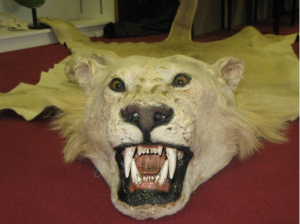News
Latest Lion Aid News
The EU to review regulations on imports of animals as trophies
Thursday 25th July 2013
 The European Union has invited LionAid to participate in a review of current regulations concerning the import of hunting trophies of species listed on their Annex B (equivalent to CITES Appendix II). We feel this review is well overdue and therefore increasingly urgent. It should be noted that a number of EU Member States proposed a comprehensive review of current import practices by all parties at the recent CITES Conference, but this was watered down to only include elephant and rhino trophies. Such trophies belatedly have to be issued with import permits (not required before, an export permit from the country of origin sufficed) – in response to the rampant rhino “pseudo-hunting” scam facilitated by lax controls in South Africa. “Pseudo-hunting”, as you will remember, took advantage of a glaring loophole in CITES regulations where a “hunter” could legally export a rhino trophy and then quickly take advantage of the significant difference between the hunting price and the street value of the horn to turn a tidy profit. This is against the CITES rules, but to date there have been few successful prosecutions outside South Africa we are aware of (though arrests have been made in the Czech Republic and Slovakia). Such horns initially were collected by droves of Vietnamese hunters, but as eyes in South Africa slowly began to open (largely due to NGOs and the media raising questions), the syndicates began to recruit numbers of proxy hunters from the Czech Republic, Slovakia, Denmark, Poland, Russia and the USA (countries, it might be added, with significant Vietnamese communities). Trophy horns imported by such “proxy hunters” have since not surprisingly been conveniently declared as “stolen”, “lost”, cut up and given to relatives and friends, etc. It is suspected that the same scenario applies to ivory collected by “hunters” in Africa – “cut-rate” hunts are offered by many agents and operators, the ivory is legally exported, and the tusks then “disappear”. Again, the EU is involved – CITES records indicate substantial increases in numbers of Danes and Portuguese, for example, showing a sudden interest in elephant hunting and significant discrepancies between numbers of exports versus imports. Ivory from hunts often seems to vanish into thin air. The EU is proposing to “address” the issue by contemplating a requirement for import permits in addition to export permits for hunting trophies. Lions fall in a different category, in that there does not appear to be an illegal trade in hunting trophies per se. However, we will advocate a complete ban on the import of lion trophies from South Africa. Such trophies virtually all originate from the captive breeding industry (“canned hunting”), are mislabelled as “wild” by South African authorities to allow hunters to place them in record books maintained by hunting organizations like SCI, and are hunted by very cruel techniques. In fact, the entire captive breeding for trophy hunting concept should have come under much greater scrutiny and sanctions in the past, but such was the attention given to rhinos, elephants and tigers that the industry was allowed to blossom and bloom. If the EU prohibits import of seal skins from Namibia and Canada on the basis that this industry is based on cruel practices, why not similarly ban imports of lion trophies emanating from the canned hunting industry? Since South Africa only exports captive raised lion trophies, a blanket ban would not be difficult to enforce as the issue of truly wild versus captive raised animals would not need to be considered. While over 60% of canned lion trophies go to the USA, significant numbers end up in Germany, France, Spain, etc in the EU. The necessity of an import permit for lion trophies from countries other than South Africa would also give the EU, under existing Wildlife Trade Regulations, greater latitude of ensuring that lion trophy hunting is indeed sustainable. This sustainability is currently claimed by the trophy hunting community but is increasingly being challenged by published information, surveys, and indeed the governments of Botswana and Zambia. We will seek backing from our supporting organizations like IFAW, HSI, EIA and others to ensure that lions are not once again swept under the carpet in the exclusive stampede to conserve African elephants and rhinos. Desperate though the status of such species might be, concern needs to be spread to all species suffering from unsustainable commercial offtake whether it is poaching, “pseudo-hunting” or legalized trophy hunting. If you have not already signed up to our mailing list, you can add your name here and keep up to date with our ongoing work and, most importantly, DONATE to support our work to conserve the remaining fragile lion populations. Thank you. - See more at: http://www.lionaid.org/blog/#sthash.FDoAV1Yr.dpuf Categories: Events/Fundraising, Trophy Hunting, Extinction, Domesticating Animals |
Posted by Pieter Kat at 16:49
No comments have been posted yet.
Add a new comment
Existing user
New user sign up



